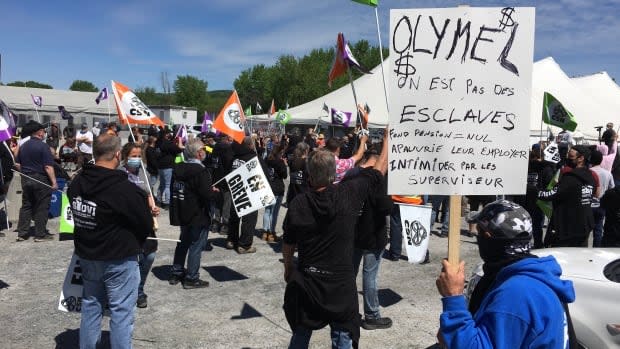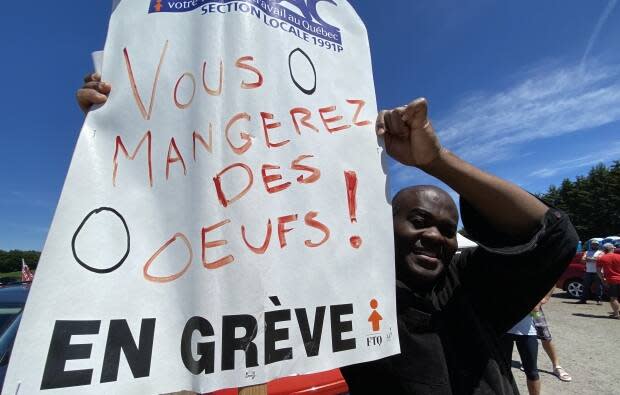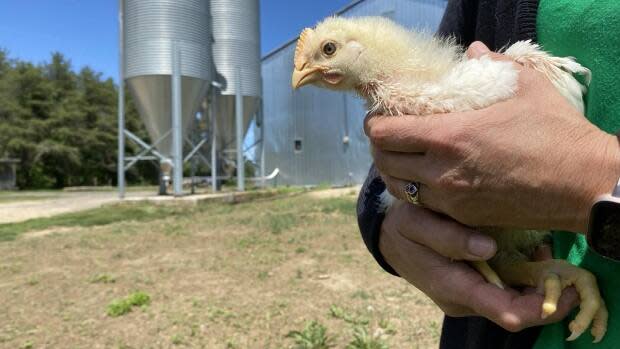Major labour strikes in Quebec meat industry lead to food waste and demands for change

When a poultry plant near Quebec City announced last month it had euthanized one million chickens because of an ongoing strike, it prompted indignation from the public and politicians alike.
Within days, the workers and the employer, Exceldor, came to an agreement, but only 66 per cent of those workers voted in favour.
"That's not a victory. It means a third of the workforce is unhappy," said Roxane Larouche, who is a spokesperson for the union representing the workers, the United Food and Commercial Workers, known by its French acronym, TUAC.
Now, pork producers say if another strike in Quebec's meat industry lasts any longer, thousands more animals may have to be put down. The chickens were sent to a rendering plant to make animal feed.
Industry leaders say having two strikes, with so much potential for food waste and so close together, is unprecedented and should lead to changes in an industry long beset by some of the worst working conditions in the economy.
But a serious labour shortage in the province may be giving workers more leverage in their demands.
"If you take slaughterhouses, for example. You've got workers, who, day after day, work with living animals who are going to be slaughtered. You have to desensitize yourself to this violent part of the job," Larouche said.
"It's not pleasant at all."
The repetitive movements, cold temperatures, strong smells, and close quarters in another sector of the meat industry — processing plants — don't make it any more appealing to work in.
"Everywhere in the production chain of food processing, there are labour shortages because the salaries just don't cut it. And there needs to be better working conditions," Larouche said.
The pandemic has also highlighted the hardships faced by workers in those jobs, with some of the largest workplace COVID-19 outbreaks occurring in meat processing facilities, including the one facing a strike in Quebec's Beauce region.

A months-long strike at Olymel's Beauce facility
The strike, which is at the Olymel pork slaughterhouse in Vallée-Jonction, began at the end of April and has hit several standstills. Union representatives and management are back at the negotiating table this week, but salary remains a sticking point.
That factory is one of the largest in the province, receiving between 35,000 and 37,000 pigs every week. About 1,150 people work there, while 550 work at the Exceldor poultry plant.
An Olymel spokesperson, Richard Vigneault, has blamed the drawn-out strike on the union.
"It's too bad. A factory is meant to be in operation," Vigneault told Radio-Canada earlier this week. "The union is the one that decided to have an unlimited strike."
The union is quick to rebut that assertion.
"With the labour retention problem we have, the employer has to realize it has to pay people properly if it wants to keep them. For that, we need to be talking dollars, not cents," said Martin Maurice, the union representative for Olymel Vallée-Jonction employees.
On that point, Vigneault says, "there's a gap between what they're asking and what we can offer while remaining competitive."
Olymel has estimated the salary increase requested by the union to be about 35 per cent for the first year of an agreement and 51 per cent for three and a half years after that.
In May, the Quebec government invested $150 million in Olymel, an incentive to keep the Saint-Hyacinthe-based company operating in the province.
Larouche, the TUAC spokesperson, believes the deaths of the one million chickens at Exceldor could have easily been avoided because of the advance warning the union gave the co-operative of its intention to strike.
"Our belief is that this was a strategic decision by Exceldor to kill that many chickens to put pressure on the workers," she said.

Larouche believes Olymel has handled its strike better, noting politicians haven't had to come out with statements saying, "the waste has to stop," as Quebec Premier François Legault did last month in the Exceldor case.
Psychological impact on producers
Whether the union or the employer is to blame for the waste matters little to producers, for whom the ordeal has been agonizing, according to Marcel Groleau, the president of the Union des producteurs agricoles (UPA), Quebec's largest farmers' union.
"The psychological impact — the producers found it really difficult," Groleau said of the dead chickens at Exceldor.
"The damages [of the strikes] are to the industry overall, though. It gives consumers a bad image of the sector and how it's working."

Automation has led to the consolidation of meat plants across North America. But with fewer yet bigger plants, there leaves little room for contingency plans when something goes wrong.
Groleau says the merging of plants is a "natural phenomenon" that is tough to stop from happening. Meat-processing and slaughtering plants want to keep up with industry demands and need to upgrade equipment to do so.
To make those upgrades profitable, they need to produce more, so smaller plants merge or get bought by bigger plants.
Companies have to come up with plans for transporting animals elsewhere, even if that means bringing them to another province or even the United States, Groleau said.
"Until now, though, we hadn't seen these kinds of impacts. It's going to have to teach us a lesson. We need to be able to prevent what's just happened."


